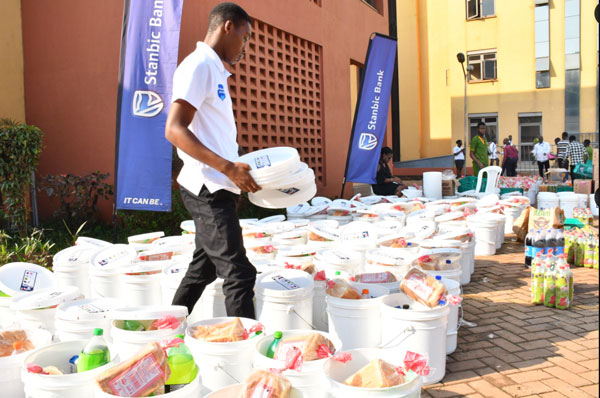
Kampala, Uganda | THE INDEPENDENT | Kawempe National Maternal Hospital is witnessing a noteworthy decrease in avoidable maternal and neonatal deaths, thanks to corporate support received from various companies as part of Corporate Social Responsibility initiatives.
During the reception of essential utility commodities from Stanbic and its partners, Dr. Emmanuel Byaruhanga, the hospital’s executive director highlighted the marked reduction not only in avoidable maternal deaths, but also in neonatal fatalities.
“Managing an average of 80 daily deliveries, including 30 Cesarean Sections, at the 200-bed facility is made feasible, safe, and effective with collaborative support from the private sector,” Dr. Byaruhanga emphasized.
He said that while the government provides most equipment and necessities, partnerships are essential as the government alone cannot fully meet the hospital’s requirements due to budget constraints.
“Of course, the government provides most of the equipment, and the requirements, but partners must also support because the government alone doesn’t have enough money to meet all the hospital’s needs,” he said.
With assistance from private sector contributions, expertise availability, and consistent medical supplies from the government, the hospital has witnessed a drop in avoidable maternal deaths to fewer than five per month compared to double digits in previous years.
Dr. Byaruhanga stressed the need to alleviate the hospital’s congestion by empowering health centers in the Kampala metropolitan area. This approach aims to manage preventable maternal and neonatal deaths at these centers instead of referring critical cases to Kawempe, where situations often exacerbate. Stanbic’s donations, particularly to the neonatal clinic, serve the primary goal of easing congestion by strengthening lower-tier health units. This strategic move aims to reduce pressure on Kawempe Hospital and enhance the quality of services offered.
“Most importantly, Stanbic has donated several equipment, especially to the neonatal clinic, for which one of our primary goals is to decongest the hospital because when you have too many mothers and babies, the pressure is mounted on everything, hence breakdowns. So we want to reduce the number of deliveries that are here, by operationalizing the lower health units, because upon any hindrance, like low supplies, they all refer those mothers here, so if these units would be functional, then we would relieve the pressure on Kawempe, and there we would offer more quality services.”
Recognizing the impact of utility commodities support on hospital staff morale, Dr. Byaruhanga underscored its significance as a gesture of appreciation for their dedicated work. Ann Juuko, the Chief Executive of Stanbic Bank Uganda, commended the hospital staff’s frontline efforts in ensuring safe motherhood. She emphasized the private sector’s role in supplementing where the government faces limitations, fostering a country of which citizens can be proud.
“It is the responsibility of the private sector, and the population to supplement where the government has failed, because this is home we have nowhere else, and it’s only then that we can build a country that we are proud, not only for us but for our children and generations to come, let we sow the seeds for a better Uganda.” Acknowledging Kawempe Hospital’s responsible utilization of donated equipment, Juuko highlighted the positive outcomes of the Ministry of Health’s supportive public-private partnership for the nation’s benefit.
Regarding decongesting Kawempe referral hospital, Juuko pledged continued support, ensuring lower-tier health centers are equipped to provide high-quality services akin to Kawempe’s standards.
“It is one thing to chase people away, but what will they find there? It is our responsibility to ensure that where we are sending them, is as good as here, with the same equipment, and the same doctor so the quality of service is not compromised, so let us continue to build the capacity of these decongestion centers.”
****
URN
 The Independent Uganda: You get the Truth we Pay the Price
The Independent Uganda: You get the Truth we Pay the Price


